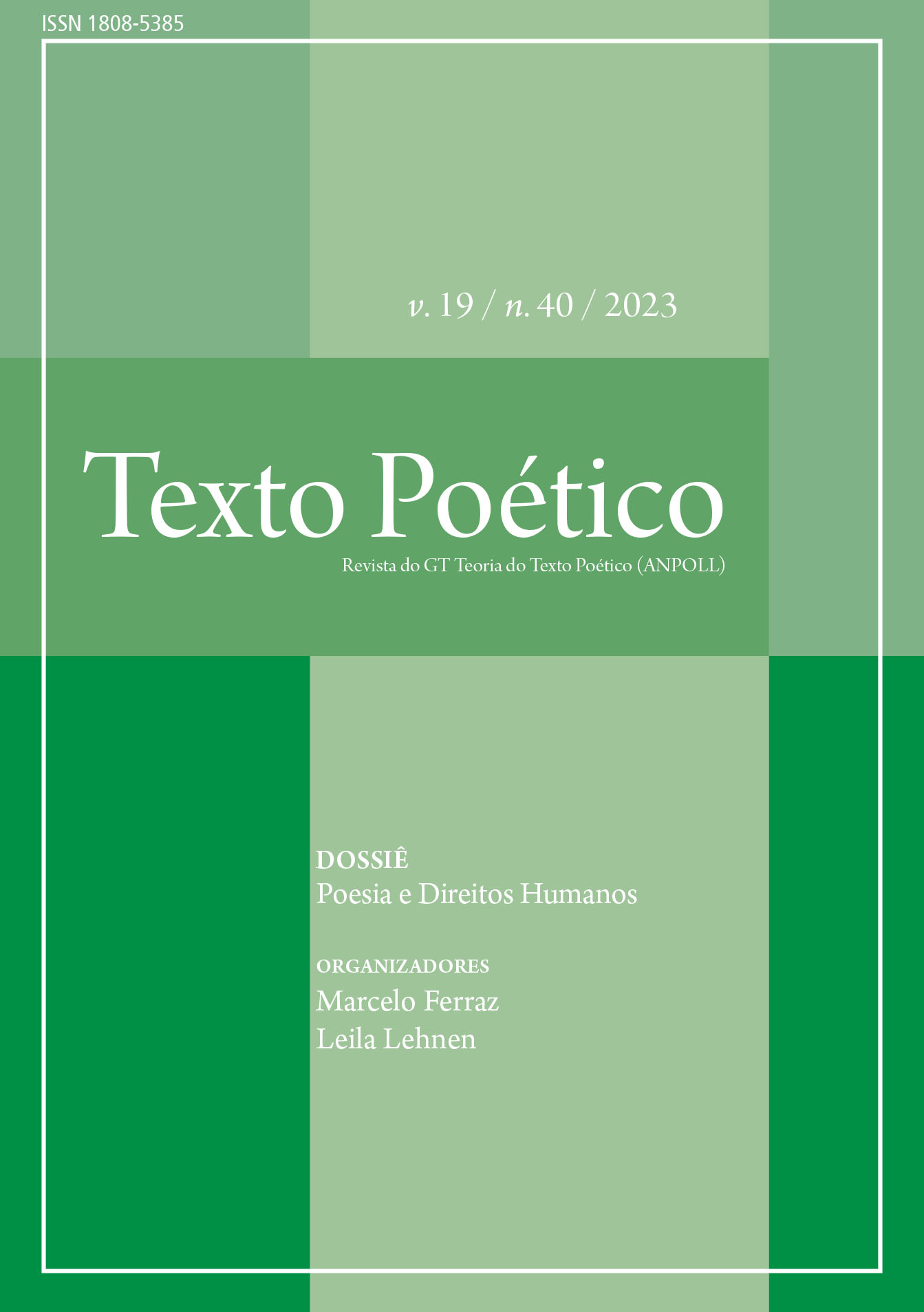“Detritos Humanos”, Human Rights: The Baudelarian City and the Production of Life
DOI:
https://doi.org/10.25094/rtp.2023n40a1028Keywords:
Charles Baudelaire, Poetry, Human rights, UrbanismAbstract
The dialogue between Charles Baudelaire’s poetry and human rights is highlighted, considering the poet’s criticism of the dehumanization of Haussmannian urbanism. This dialogue would not be built as a tribune speech, but an ethical-aesthetic thought against the belief in the universality of the right to the urbanized city, of which Paris became an emblem in the Second Empire. Contesting such universality, Baudelaire’s poetry would question the conditions of production of the city’s humanity and would present relevance for today’s reflections on the correlation between space and the right to the city, which has historically been denied to peripheral and marginalized populations.
References
AMARAL, Gloria Carneiro do. Victor Hugo e Baudelaire: afetos controversos. Lettres Françaises. n. 5, p. 61-76, 2003. Disponível em: file:///C:/Users/jr_vi/Downloads/7+-+Art+6%20(1).pdf. Acesso em 14 mar. 2023.
BAUDELAIRE, Charles. Les Fleurs du mal. In: Oeuvres complètes. Paris: Gallimard, 1975.
BAUDELAIRE, Charles. Meu coração desnudado. Tradução: Aurélio Buarque de Holanda. Rio de Janeiro: Nova Fronteira, 1981.
BAUDELAIRE, Charles. O pintor da vida moderna. In: BARROSO, Ivo (org.). Poesia e Prosa. Rio de Janeiro: Nova Aguilar, 1995.
BAUDELAIRE, Charles. Pequenos poemas em prosa. Tradução: Aurélio Buarque de Holanda. Rio de Janeiro, Nova Fronteira, 1980.
BENJAMIN, Walter. Experiência e pobreza. In: Magia e técnica, arte e política. Ensaios sobre literatura e história da cultura. Obras Escolhidas. v.1. Tradução: Sergio Paulo Rouanet. São Paulo: Brasiliense, 1987a.
BENJAMIN, Walter. História cultural do brinquedo. In: Magia e técnica, arte e política. Ensaios sobre literatura e história da cultura. Obras Escolhidas. v.1. Tradução: Sergio Paulo Rouanet. São Paulo: Brasiliense, 1987b.
BENJAMIN, Walter. Walter Benjamin. KOTHE, Flávio R (org.). São Paulo: Ática, 1991.
CANNON, James. La zone entre classes laborieuses et classes dangereuses: les marges parisiennes de la Belle Époque à la fin des années 1970. Espaces et sociétés. v. 171, n. 4, p. 37–54, 2017. Disponível em: <https://www.cairn.info/revue-espaceset-societes-2017-4-page-37.htm&wt.src=pdf>. Acesso em: 22 maio 2023.
DELFOSSE, Guillaume. Claude Gueux, l’abolition de la peine de mort comme condition du droit? Revue interdisciplinaire d’études juridiques. v. 68, p. 225-254, 2012.
DE MAISTRE, Joseph. Les Soirées de Saint-Pétersbourg ou Entretiens sur le Gouvernement Temporel de la Providence. Lyon/Paris: J. B. Pélagaud, 1854.
HUNT, Lynn. A invenção dos direitos humanos: uma história. Tradução de Rosaura Eichenberg. São Paulo: Companhia das Letras, 2009.
LEFEBRVE, Henri. O Direito à cidade. São Paulo: Centauro, 2001.
NOIRAY, Jacques. De Baudelaire à Villiers: les envers ironiques de la charité. Romantisme, v. 180, n. 2, p. 59-68, 2018. Disponível em: <https://www.cairn.info/revue-romantisme-2018-2-page-59.htm>. Acesso em: 22 maio 2023.
SCEPI, Henri. Revenance de l’épique dans “Le Spleen de Paris”. Romantisme. n. 172, p. 69-78, 2016.
SILVA, José Afonso da. Direito Urbanístico Brasileiro. São Paulo: Malheiros, 2008.
VILARINO, J. “A Uma Passante” de Charles Baudelaire: os três tempos da imagem. Texto Poético, [S. l.], v. 18, n. 35, p. 21–45, 2022. DOI: 10.25094/rtp.2022n35a850. Disponível em: https://textopoetico.emnuvens.com.br/rtp/article/view/850. Acesso em: 26 jul. 2023.
Downloads
Published
How to Cite
Issue
Section
License
I authorize the Texto Poético Journal to publish the paper of my authorship/responsibility that I now submit, in case it is accepted for online publication.
Moreover, I declare that this contribution is original and that it was not submitted to any other editor for publication.
The copyright of the works published at the virtual space of the Texto Poético Journal are automatically entitled to the journal. Their total or partial reproduction is conditioned to the authors' citations and publication data.

Texto Poético is licensed under a Creative Commons - Attribution-NonCommercial 4.0 International (CC BY-NC 4.0).









